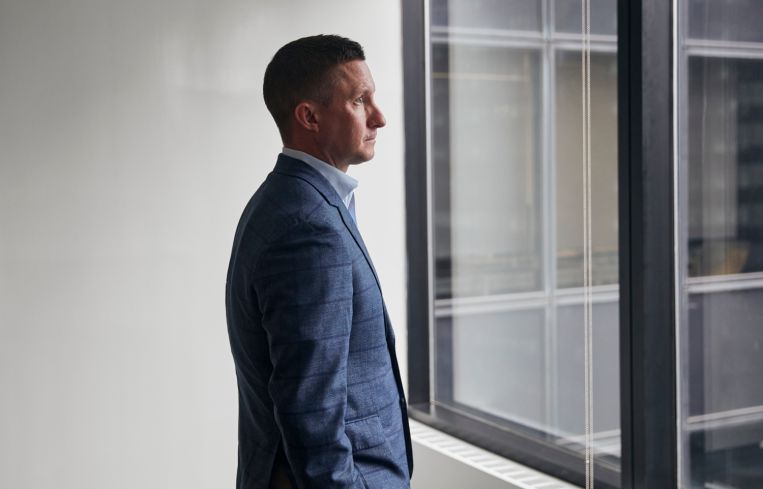Iron Hound Carves Niche in Navigating Lengthy CMBS Workout Process
By Andrew Coen October 5, 2023 6:00 am
reprints
Delinquencies for commercial mortgage-backed securities (CMBS) loans are on the rise this year amid the higher interest rate environment. But, as choppy market conditions show no sign of abating, executing a CMBS workout is far from smooth sailing for borrowers.
“It can take a lot longer than I think anyone expects, and it’s sometimes an educational process for the people involved,” said Christopher Herron, a managing director at Iron Hound Management, a firm that negotiates new loan originations but also CMBS loan restructurings on behalf of borrowers. “There are multiple layers of people that have to weigh in and approvals that have to be obtained.”
Herron, who co-founded Iron Hound in 2009 with Rob Verrone after eight years at Wachovia — where he also focused on CMBS and structured finance — said the process from start to finish for a workout period often lasts more than a year, given the number of parties involved in the securitization process.
Today, as the inflationary interest rate environment delivers another prolonged and painful blow to some borrowers already fighting to stabilize their properties following COVID’s impact, refinances are harder than ever to come by — especially for out-of-favor asset classes such as office.

As such, Herron said some conversations with borrowers facing loan maturities that began as refinance inquiries quickly turned instead into loan extension discussions this past year.
Successful restructurings today hinge on sponsors’ track records and also their willingness to commit new capital to their properties to create value for their “best and highest use,” Herron said. The capital can come from the sponsor themselves or a third-party investor, and be used in various ways from repositioning and upgrading a property’s current form to today’s standards, or a conversion to a different use — as many in the industry have begun to analyze and consider.
A recent example following the former blueprint involved a 30-month extension negotiated by Iron Hound for a $38 million CMBS loan on One South Broad Street in Philadelphia. In this instance, Herron and his colleague Anthony D’Amelio negotiated the modification when the ownership of the 25-story Class B office tower, AION Partners, conducted a recapitalization to improve leasing occupancy levels, contributing further equity to the deal while keeping debt low.
“Every single restructuring that we do requires some level of new capital commitment from ownership,” Herron said. “That capital can be used for a whole host of things, but our biggest focus always is figuring out a way to negotiate for the money that’s coming in [from the sponsor] to go directly to the capital needs at the property level, and have those needs accounted for in the restructuring.”
It’s during times of dislocation and distress that CMBS restructurings come into play, of course, and the commercial real estate industry has had plenty of tumult to contend with.
In the depths of the COVID-19 pandemic, Iron Hound completed an 18-month effort to modify a defaulted $846.2 million CMBS loan on behalf of Hudson’s Bay Company (HBC) and joint venture partner Simon Property Group secured by 24 Lord & Taylor stores along with 10 Saks Fifth Avenue locations. The resolution, completed in October 2021, was finalized at par with no discounted payoff or interest forgiveness.
The HBC CMBS workout period began at a unique time early in the pandemic when the JV partnership missed a loan payment on April 1, 2020, and the loan transferred to special servicing in May as the sponsorship grappled with mandated store closures. As part of the restructuring agreement, HBC agreed to pay monthly debt service and operating rent during the workout period and also agreed to a ramp up its schedule to resume full operating rent payments by October 2022.
Even though the year-and-a-half restructuring process was on the long end for a CMBS workout, the undertaking would have taken even longer without the services of a company like Iron Hound, according to Ian Putnam, president and CEO of HBC Properties and Investments.
“In a difficult environment like COVID, where a lot of bad things were going on with retail and retail real estate, having the cool head of Chris and the Iron Hound team to broker a settlement was extremely helpful,” Putnam said. “All we were looking for was time. We weren’t trying to reduce any payments or reduce any principal amounts owed, so we had a pretty good story — but even that was difficult, and Iron Hound was very helpful in getting us across the finish line.”
The volume of CMBS workouts has been on the upswing in 2023 driven largely by nearly $100 billion of single-asset single-borrower (SASB) securitizations scheduled to mature this year, according to CMBS data firm CRED iQ. The vast majority of that expiring SASB debt is tied to floating-rate loans that have extension options available, the CRED iQ data shows. Roughly $29 billion of CMBS conduit loans also have 2023 maturity dates.
Jonathan Mechanic, chairman of law firm Fried Frank’s real estate department, said he is working on around 10 CMBS workouts now at various stages involving office and retail properties. Mechanic said that while there has not been a “torrential flood” of CMBS workouts in 2023, he noted that this could change given the number of looming maturities ahead for the remainder of the year and into early 2024.
Mechanic said he finds working with borrower representatives very helpful in navigating the nuances and lengthy proceedings that pop up in CMBS workout processes between the multiple parties involved. That’s especially true when the borrower rep has a lending background, as is the case with Herron as well as Verrone, who prior to co-founding Iron Hound in 2009 managed Wachovia’s large loan group. Colleague John Wood also worked for Wachovia, while the firm’s Kevin Thompson spent 13 years at CW Capital.
“There are many people who are borrower reps who have been lenders in their time, so they have sat on both sides of the table and know the hot buttons of what things lenders can and can’t do,” said Mechanic, who’s worked on numerous restructurings with Iron Hound since the firm’s founding 14 years ago.
“Different lenders have different needs and circumstances depending on whether it is on the balance sheet and whether it’s a securitization, what you’re dealing with and what they can do within a pooling and servicing agreement,” Mechanic continued. “Then, there’s also the controlling certificate holder [to consider] who basically has the most junior piece, and they’re the ones who are likely to be most affected by the workout.”
Still, seasoned borrower reps like Iron Hound have the experience — and battle scars — to help.
“We’ve been actively involved in balance sheet and CMBS restructuring for the past almost 15 years. Complementary to our restructuring business is our debt placement business, but we’re never without a significant number of active restructuring negotiations,” Herron said. “If you’re bringing someone in to help, I don’t think that there’s anything better than someone who has consistent experience in the market through cycles.”
As such, the firm has worked on some mega deals, including the modification of Workspace Property Trust’s $1.3 billion CMBS facility, securing a two-year extension for loans backed by 146 suburban office and industrial portfolio in July.
The CRED iQ CMBS delinquency rate reached 5.07 percent in August 2023, marking a 177 basis point, or 56 percent, jump since January, with 62 percent of the newly delinquent loans a result of maturity defaults or refinancing challenges. The percentage of CMBS loans now with a special servicer was at 6.73 percent in August, according to CRED iQ.
While it’s easy to assume a special servicing transfer means the worst, Herron stressed that transfers can happen for multiple reasons beyond just default, and in 2023 they’re often the result of how much longer it takes to refinance loans in higher interest rate environments. He said the percentage of office CMBS loans hitting special servicing will likely increase in the near term by virtue of current market conditions, however.
“The goal is to get a structure in place that allows ownership to bridge this next two, maybe three years of what may be a little bit of turmoil,” Herron said. “I don’t think anyone believes this is the rate environment or the capital markets environment that we’re going to be in forever, but the question is how long, and how do you get from point A to point C?”
While there’s plenty of questions — and woes — around rate instability, Herron suggests that property owners begin conversations about potential loan restructurings around a year before their debt is scheduled to mature, since resolutions can take significant time to resolve amid a volatile and uncertain market.
Herron said the current CRE market dislocation is far different from the Global Financial Crisis of 2008, because there is far more uncertainty about the future outlook for certain property sectors like office and how to best tackle struggling assets. He said some office owners will try to convert their properties into residential use, but the process will take time.
While closing a CMBS restructuring can be a bumpy process, Herron said honest communication between parties is key so expectations can be met.
“If we’re transparent and upfront about what it takes to get [a restructuring] done, it eliminates surprises down the road,” Herron said. “It helps set the stage for how we go about our business.”
Andrew Coen can be reached at acoen@commercialobserver.com.



